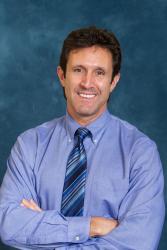Press Releases

Cliff Douglas, an internationally recognized expert in tobacco control policy and law, has joined the American Cancer Society as vice president for Tobacco Control and director of the American Cancer Society Tobacco Control Center. For the past eight years, Douglas has overseen the University of Michigan Tobacco Research Network (UMTRN), an association of faculty members, researchers, and staff committed to tobacco and nicotine research and service. As a faculty member with the University of Michigan School of Public Health, Douglas has taught the graduate tobacco control policy seminar for the past ten years.
“We are honored and excited that Cliff has joined the Society leadership team as the new vice president for Tobacco Control,” said Dr. Richard Wender, chief cancer control officer for the American Cancer Society. “In this role, Cliff will establish the American Cancer Society Tobacco Control Center to redouble our tobacco control efforts to accelerate the decline in tobacco use and tobacco-related cancer deaths. Cliff is well known in the tobacco control community for his extraordinary leadership and tremendous contributions in the fight to end the tobacco epidemic.”
Additionally, for the past five years Douglas has served as the consulting tobacco control policy advisor for the U.S. Assistant Secretary for Health, Dr. Howard Koh, and more recently in the same capacity for the Office of the U.S. Surgeon General. Douglas co-chaired and co-authored the U.S. Department of Health and Human Services’ first-ever national tobacco control strategic action plan, Ending the Tobacco Epidemic: A Tobacco Control Strategic Action Plan for the U.S. Department of Health and Human Services, released by U.S. Secretary of Health Kathleen Sebelius in 2011, and also co-authored HHS's follow-up report, Ending the Tobacco Epidemic: Progress Toward a Healthier Nation, in 2012.
In his dual capacities with HHS and the University of Michigan, Douglas also served as the founding director of the Tobacco-Free College Campus Initiative, a partnership of HHS, the University of Michigan and the American College Health Association.
Earlier in his career, Douglas coordinated the successful national advocacy campaign to prohibit smoking on all commercial airline flights in the U.S., on behalf of the American Cancer Society, the American Lung Association and the American Heart Association, acting as the Coalition on Smoking or Health. He also served as special counsel on tobacco issues for Rep. Martin Meehan (D-MA), for whom he managed the Congressional Task Force on Tobacco and Health, which Congressman Meehan co-chaired.
As an attorney, Douglas has represented the American Cancer Society, the American Lung Association, Americans for Nonsmokers' Rights, the Tobacco Control Legal Consortium, and others in defense of local smoke-free restaurant and workplace laws that were challenged in court, and also served as co-counsel or expert consultant in the state attorney general litigation against the tobacco industry in the 1990s and various landmark lawsuits brought by injured smokers or their survivors. He also currently serves on the legal team defending the nation of Uruguay in an international trade action brought by Philip Morris International, challenging that nation's groundbreaking tobacco control laws.
As chronicled in the book Civil Warriors: The Legal Siege on the Tobacco Industry by investigative journalist Dan Zegart, Douglas was also responsible for assisting several tobacco company whistleblowers in going public, enabling them to assist the U.S. Food and Drug Administration (FDA) in its historic investigation of the tobacco industry, to testify before Congress, and to serve as key witnesses in litigation against the tobacco industry. He also initiated a landmark national media expose on the tobacco industry’s manipulation of nicotine to addict smokers, which prompted the FDA to seek to regulate tobacco products for the first time and led to historic congressional hearings, including the iconic congressional hearing at which the chief executives of the largest tobacco companies testified under oath that nicotine is not addictive and smoking does not cause cancer.